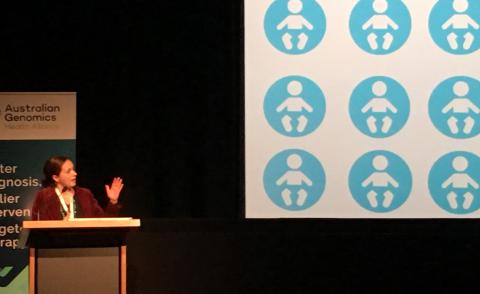
Professionals from across the Alliance gave eight oral presentations and five poster presentations across three national conferences recently held in Brisbane: the Health Informatics Conference 2017, the Australian Genomics National Conference and Human Genetics Society of Australia Annual Scientific Meeting 2017.
At a joint satellite meeting of the Australian Genomics Health Alliance and the Human Genetics Society of Australia (HGSA), Dr Natalie Thorne and Dr Sebastian Lunke jointly presented on the Alliance’s model for variant curation and our prototype system for sharing curated variants (LOVD+).
Presentations were given at HGSA on initial results from the Alliance’s current clinical projects, Complex Care in Children and Congenital Deafness, as well as on follow-up health economic analysis from the Childhood Syndromes clinical project.
‘It’s been great again this year to see the number and variety of presentations given, based on the Alliance’s results,’ said the University of Melbourne’s Professor David Amor, leader and presenter of the Congenital Deafness project. ‘We are leading the way in developing evidence for the usefulness and cost-effectiveness of genomic sequencing in the diagnosis and treatment of patients.’
At the Health Informatics Conference, the Alliance’s Data and Technology Program Manager, Kate Birch, presented on development of the Alliance’s shared clinical system for genomic data, and some of the ethical considerations in planning and building this system. CSIRO’s Dana Bradford presented Alliance research describing a preliminary structure for a decision-support tool for clinicians, and how such technology may be evaluated. This paper was selected for publication as one of the top 24 presented at the Health Informatics Conference 2017.
In the lead-up to the August conference season, Melbourne Genomics’ immersive 2-day workshop in variant curation was presented in Auckland by Victorian Clinical Genetics Services, to enhance development of the Genetic Health Alliance of New Zealand. And, in May, Associate Professor Tiong Tan presented on the diagnostic utility and cost-effectiveness of singleton exome sequencing for children with genetic disorders, at the Chinese University of Hong Kong Genomics Symposium.
[Image: Dr Zornitza Stark, speaking at the Australian Genomics National Conference on the follow-up health economic analysis of Melbourne Genomics' Childhood Syndromes clinical project.]
